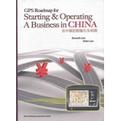在中国把经验化为利润
2012-4
世界图书出版公司
林德良,罗颖媚 著
233
在国内开展业务的外商经常会在日常经营上遇到许多问题而无法得到足够可操作的参考信息。本书的作者根据其多年为外商提供咨询服务的实践工作,集合了外资公司设立、财务、税务、劳动法与签证等相关资料,为外商进驻中国市场在经营上提供可靠、具体的实务参考。本书是准备前来中国投资或目前已经在中国工作的外籍管理者不可多得的参考工具书。
Mr.Kenneth Lam,has 20 years experiences in running multi-nationao chain operations-including 15 years in China-inleading positions with various conglomerates in consulting,retailing.manufacturing as well as service industries. Kenneth founded AsianBiz Center&Consulting Co.Ltd.in Shang-hal;as CEO,he has expanded the company into one ofthe leadingserviced office providers in China,alongside with providinginteqrated solutions and consulting services.Through AsianBiz.Kenneth provides valuable advice.ranging from corporatestructure,tax advice to accounting practices,to relieve clients ofunnecessary cost.bureaucracy and hassle. In line with the publication ofthis book.Kenneth contributes andshares with entrepreneurs his insights in doing business in China. Ms.Helen Law holds a double Bachelor Degree in Finance and Hotel Management(High Honors)from the University of Hawaii,and MBA(Dean's List)from the University of WesternOntario,Canada. Helen started her career with 2 reputable chains(Regent andDynasty-Inter Continental)In developing hotels,serviceapartments,clubs and multi.functionao reao estate projects inChina(including the Mainland,Hong Kong SAR and TaiwanProvince),Vietnam,Sri Lanka,Thailand and USA.With thisbackground.she founded Wealth lsland Consultants(China)which focuses ON providing planning and hospitality consul-tancy services to property developers and Government institu.tions in China.Recently,Helen has carried her entrepreneudalsptit even further by founding Triton Wines&Catering(based inShanghai,joint-venture with an Australian winery). Meanwhile,Helen also provides services to her Alma Mater aswell as the University Of Hong Kong.and writes teaching casesusing her China projects as practical reference.
Prologue:Purpose of this Book Paet 1 Before Starting Your Business in China 1.1 Understanding China:A Country of Vast Regional Differences 1.1.1 Historica[Background 1.1.2 Regional Differences 1.2 UnderStanding the Government's Organization&Role of Key Authorities 1.2.1 Central Government Organization Chart 1.2.2 Key Authorities in China 1.3 UnderStandina China's onvestment Policies 1.3.1 Open Door Policy since 1978 1.3.2 China's Basic Means of Absorbing Foreign Investment 1.3.3 Exploitation 1.3.4 BOT Projects 1.4 Stages of Foreign Involvement 1.5 Changes after Joining WTO&Worldwide Financial Crisis 1.5.1 Major CommitmentS for WTO 1.5.2 QFII 1.5.3 QDII 1.6 Regional Imparity Regarding Investment Environment 1.6.1 Best Regions for Business in China 1.6.2 Gateway Cities Versus 2nd Tier&3rd tier Cities 1.6.3 Eastern China&Yangtze Delta 1.6.4 Centra0&Western China 1.6.5 North Eastern China 1.6.6 Southern China-ASEAN Market 1.6.7 Hai Nan&Sanya:The New ontemational Tourism Destinations 1.6.8 Pearl River Delta.Hong Kong&CEPA 1.6.9 Zaiwan&ECFA Part 2 Starting A Business in China 2.1 The"Go Ahead"Decision 2.1.1 Formulating Strategies 2.1.2 Understanding the Government Policies 2.1.3 Taxation Planning 2.1.4 Deciding on Investment Structure and Defining Business Scope 2.1.5 WFOE Defined 2.2 Setting Up a Wholly Foreign Owned Enterprise 2.2.1 WFOE Organizational Structure 2.2.2 Key Issues Regarding WFOE Incorporation 2.2.3 Types of WFOE 2.2.4 WFOE Application 2.2.5 Feasibility Study Report 2.2.6 Annual Audit&Annual License Review 2.2.7 Increasing Working Capital 2.3 Setting Up a Representative office 2.3.1 Features of an RO 2.3.2 New Regulation Changes on the RO 2.3.3 Insights into the Policy Changes on the Ro 2.3.4 GeneraL Comments 2.3.5 Understanding the Application Prerequisites 2.3.6 Full.time&Part-time Chief RepreSentative 2.3.7 Application Procedures 2.3.8 Time Table for RO Set Up 2.3.9 Special Approval 2.3.10 Operating an RO 2.3.11 Taxation for RO 2.3.12 Ro Tax Filing 2.3.13 Accounting{or ROs 2.3.14 Annua0 Auditing for RO 2.3.15 Employment ossues for RO 2.3.16 Work Visa.Work Permit&Residence Permit 2.3.17 Relocation of an RO&Changing a Chief Representative 2.3.18 Deregistration of a Representative Office 2.4 Comparisons between RO and WFOE 2.4.1 RO VS WFOE-Capital Structure 2.4.2 RO VS WFOE-Operations&Business Scopes 2.4.3 RO VS WFOE-Taxation 2.4.4 RO VS WFOE-Maintenance Cost 2.5 Business Franchising 2.5.1 Investment Structures on Franchising Business 2.6 Risks of Investing through"Hidden-Ownership" Part 3 China's Accounting & Tax Systems 3.1 Historical Development of China's Accounting System 3.2 Bases&Concepts of China's Accounting System 3.3 Tax Laws&Regulations 3.3.1 The New Enterprise Income Tax Law 3.3.2 Preferential Policies 3.4 Corporate Income Tax 3.4.1 The Reguoation 3.4.2 IIIustration 3.4.3 Resident &Non-resident Enterprises 3.5 Business Tax(BT) 3.5.1 Introduction 3.5.2 Impact of BT on the Competitiveness of Service Industry in China 3.6 Value-Added Tax(VAT) 3.6.1 Introduction 3.6.2 General Taxpayer VS Small-scale Taxpayer C 3.6.3 Qualifying as General Taxpayers 3.6.4 Purchasing from General Taxpayer or Small-scale Taxpayer? 3.6.5 Mixed Sales Activities 3.6.6 Managing Accounting Records 3.6.7 Annual Review 3.6.8 VAT Reform 3.6.9 Impact Of VAT Changes on BT Payer 3.6.10 Impact of Changes in Export VAT Refund 3.7 Withholding Tax Rate 3.8 Consumption Tax 3.9 Stamp Duty 3.10 Auditing Requirements in China 3.10.1 Annual Audit Requirement 3.10.2 Format&Content of an Audit Report 3.11 Distributing&Repatriating Profits 3.11.1 Priorities for Distributing Profits 3.11.2 Repatriating Dividends 3.12 Fa-piao:The Chinese Invoice 3.12.1 Importance of Fa-piao 3.12.2 Types of Fa-piaos 3.12.3 Computerized Fa-piao&Tax Contro System 3.12.4 Storage of Fa-piao 3.12.5 Inspection by Tax Authorities 3.12.6 "Purchasing"Fa-piaos? 3.13 Tax Return&PaVment Deadlines …… Part 4 China's Personal Income Zax Regime Part 5 Human Resources Management Part 6 "Golden Tips"for China operations Part 7 The Expat,s"China Survival Kit" Part 8 Conclusion
版权页: 插图: negligence or malpractice over the past 3 years. By early 2009,as many as 79 foreign institutional investors had obtained QFIIqualification in China.Since they are"late.comers",their market penetration is hardlyvery significant as compared to the domestic security firms which have been establishedfor years.Some local Shanghainese observe that in a few commercial districts,thereare more security trading companies than there are convenient stores;nonetheless,few if any of these security firms belong to the 79 QFIIs.In a way.to think positively.this phenomenon can be interpreted as a big room for growth for the QFIIs.Foreignbanks faced a similar situation a few years ago when they first entered China,but bynow Hong Kong Bank,Standard Chartered Bank,Development Bank of Singapore andothers have branch networks spreading like grape vines all over the gateway cities inChina with client base penetrating to local Chinese nationals and expats alike. 1.5.3 QDII Over the past 5 years,foreign trade surplus and foreign reserve account have beengrowing rapidly,thus causing pressure to appreciate the exchange rate of Ren.min-bi(the Chinese local currency)an to allow free float and exchange of Ren-min-biinternationally.In 2006.the Chinese Government introduced the Qualified DomesticInstitutional Investor(QDII)Scheme which can be seen as a transitional arrangementallowing domestic investors to access foreign markets before the Ren-min-biis widelytraded in the world and when local capital is not permitted to move in and out of thecountry with complete freedom.
《在中国把经验化为利润》由上海世界图书出版公司出版。
